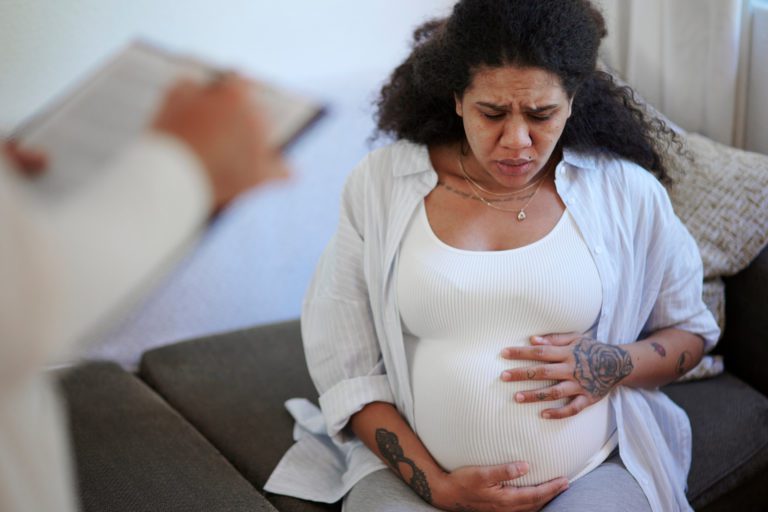Itching during pregnancy is common—especially for an ever-expanding belly. Itching may seem harmless, not something you need to mention to your provider. But severe itching can be a sign of a pregnancy complication, intrahepatic cholestasis of pregnancy (ICP). Here’s why your itching may be more troublesome than bothersome.
What is ICP?
ICP is a liver disorder that can begin in the late second or third trimester when estrogen levels peak. What causes ICP isn’t fully understood; some experts think genetics, environment, and hormones may all contribute. ICP isn’t common; it only affects a tiny fraction of pregnancies in the U.S., still, studies show it’s on the increase.
High estrogen levels can cause cholestasis by slowing or stopping the flow of bile in your gallbladder. Blocked bile acid, usually responsible for fat digestion, builds up in your bloodstream and can cross the blood-placenta barrier to your baby.
Could You Be at Risk?
You may have a higher chance of developing ICP if you have any of these risk factors:
- Prior history of ICP
- Chronic liver disease
- Chronic Hepatitis C
- History of gallstones
- Multiple gestation pregnancy: twins, triplets, etc.
- Age 35 or older in pregnancy
- South American or Northern European descent
A few studies have linked ICP with a lack of Vitamin D and selenium, a trace mineral.
All itching during pregnancy may not be harmless. Know these risk factors that place you at higher risk for developing ICP.
What Are the Symptoms of ICP?
Itch, itchy, and more itchiness! Pruritus or itching, without a rash, is the cardinal symptom of ICP and often begins before any changes in your body.
Starting around the 30th week of pregnancy, moderate to intense itching is most common on your hands and soles of your feet but can be all over; it’s also generally worse at night. Lab testing may reveal increased bile acid levels and possibly elevated liver function.
Other symptoms associated with ICP include:
- Nausea
- Decreased appetite
- Fatigue
- Dark urine
- Pale stools
- Mild jaundice or yellowing of the skin
- Pain near your liver in your abdomen
- Insomnia associated with night-time itching
ICP Complications
Circulating bile acids cross your placenta and can accumulate in your developing baby’s amniotic fluid, potentially causing severe complications including:
- Sudden intrauterine fetal death or stillbirth
- Meconium-stained amniotic fluid
- Preterm birth
- Neonatal ICU admission
The higher the bile acid levels, the greater the risk of more severe complications for your developing little one.
ICP also increases your risks for other pregnancy complications, such as:
- Gestational diabetes
- Preeclampsia
- High cholesterol
It is because of these potentially serious complications that it’s important to begin treatment for ICP immediately.
What to Expect if You Develop ICP
When treating ICP, the goal is to decrease the risk of illness and stillbirth for your baby, as well as reduce the itching sensations and improve your liver function.
Testing: Repeat blood lab work to evaluate serum bile acid levels and liver function tests.
Medication: Your provider may recommend Ursodiol (UDCA) or Actigall, 300 to 500 milligrams twice daily, until birth to reduce circulating bile acids. This medication can also relieve itching and potentially improve liver function tests. Research has shown that the use of UDCA improves fetal outcomes too.
Increased surveillance: Your provider may perform weekly biophysical profiles due to the risk of fetal illness and stillbirth. This type of ultrasound evaluates your baby’s heart rate, muscle tone, movement, breathing, and amniotic fluid level. Weekly non-stress tests, and externally monitoring the baby’s heart rate for a sustained period may also be recommended.
Birthing: Your provider may ask you to consider an early birth or induction of labor to protect your health and baby’s health. Discuss the risks of prematurity with your pregnancy care provider to help your decision-making. Depending on the severity of symptoms and bile acid levels, giving birth by 37 weeks gestation, if not earlier, is the current recommendation from The American College of Obstetricians and Gynecologists.
What is the Cure?
Birth! ICP symptoms almost always cease once your baby is born! Further investigation into liver and gallbladder function will be considered if symptoms do not return to normal after the baby is born.
Itchy skin is a nuisance. The unrelenting feelings of ‘bugs crawling under your skin’ could be ICP. Do not hesitate to speak with your pregnancy care provider about any symptoms of ICP. Advocating for yourself will help ensure your baby’s safe passage from your womb into this world.
YOU MAY ALSO LIKE: How Did I Develop Gestational Diabetes?






Comments are closed.